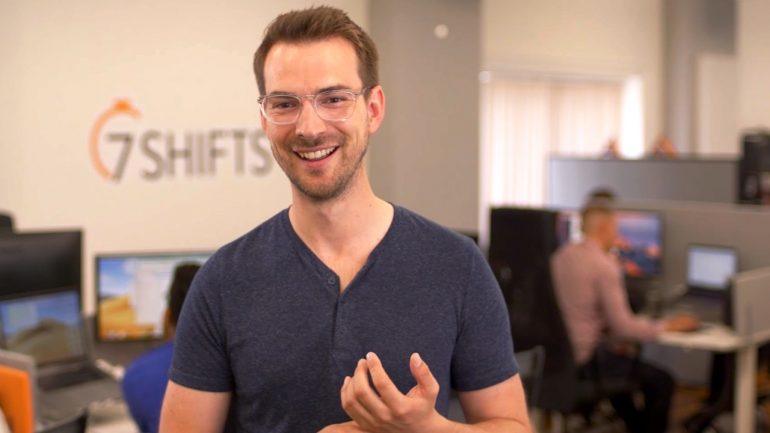Jordan Boesch wants his customers to absolutely love what he builds for them.
When he launched 7shifts in 2014, it was to help his father, who owned and operated a small restaurant in Saskatoon, Saskatchewan. Boesch saw that his father’s employees were having a hard time with their current scheduling system, so he taught himself to code. In the below video interview for the #CIBCInnovationEconomy series (recorded in July 2019), Boesch shares more about how 7shifts moved away from, then back to, the restaurant industry.
“I was never satisfied knowing that our customers weren’t over the moon about what we were doing.”
The company began to take off almost immediately, with other restaurants joining the platform. From there, Boesch expanded outside of restaurants into a broader retail sector also facing challenges with employee scheduling. Originally bootstrapped, the company joined a startup accelerator and went on to raise over $14 million in venture capital to fuel its growth.
But Boesch had a problem: his customers thought the 7shifts product was good, but they didn’t think it was great.
“I was never satisfied knowing that our customers weren’t over the moon about what we were doing,” says Boesch.
Despite founding a successful and growing business, Boesch was unsure about the future. 7shifts was founded to help his dad, but also because Boesch wanted to help restaurants.
After considering his roots, Boesch made the tough decision to focus exclusively on restaurants, effectively firing two-thirds of 7shifts’ customer base.
“It comes from the very top, of understanding who you are ultimately solving these pain points for,” says Boesch. “From that might come some really hard decisions, and you might have a fork in the road from going through that process. I think the best decisions are often the hardest.”
Most people would have predicted a 7shifts bankruptcy after eliminating nearly 70 percent of its customer base, but for Boesch, it was just the beginning. By focusing on restaurants, Boesch says 7shifts was able to cultivate and close on partnerships that generic scheduling platforms couldn’t dedicate the resources to.
“Being at that fork in the road and choosing that restaurant path meant we opened doors to all kinds of partnerships that were specific to the restaurant industry that other people hadn’t capitalized on,” says Boesch. “That was a major growth driver for us that we felt was a big contributor to our success.”
A laser focus on restaurants didn’t just create partnership opportunities, though. It also allowed the team to think more deeply about problems faced by restaurateurs beyond employee scheduling. As the restaurant industry grapples with COVID-19, 7shifts is able to provide supporting information and resources. To help solve these critical challenges faced by the restaurant industry, 7shifts has invested in AI technology.
“If I’m going to devote the amount of time that I devote to this company, it needs to be a world-changing company,” says Boesch.


